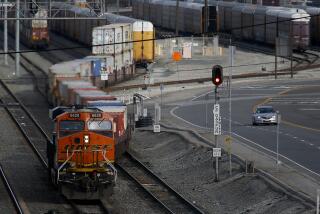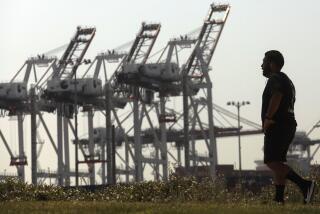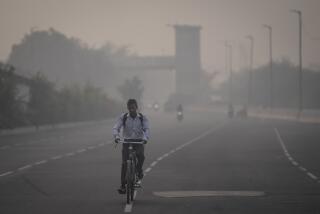Chinese hope pre-Games cleanup will be fresh start
- Share via
TAIYUAN, CHINA — Su Aimin spat on the ground, and admired the result.
“You see, it’s white,” said the 33-year-old production manager at Taiyuan Iron & Steel, pointing to his saliva. “Before, it was black. I’m not kidding.”
Although Beijing is still struggling to make the skies clear for the Olympics, a massive cleanup effort before the Summer Games has given people here a taste of fresh air. They want to keep it that way, but business groups are likely to lobby for an easing of the restrictions.
Even Taiyuan residents acknowledge that improving the environment might come at the cost of some jobs and economic development.
Taiyuan, an industrial city 250 miles southwest of Beijing, has long been considered one of the most polluted in the world. But in recent months, authorities have closed dozens of coal mines and coking operations. In addition, production at steel mills, cement factories and power plants has been cut back or suspended, as it has in several other provinces, to reduce the pollution blowing into Beijing during the Olympics.
“The air now is the best in at least 10 years,” said Jin Gongyuan, a professor at Shanxi University of Finance and Economics in Taiyuan.
But the big question for Jin and others in this provincial capital of 3 million is: What will happen after the Olympics?
“Could it be possible that such measures would last longer or even be permanent?” Jin asked. “Not only do foreign athletes need fresher air, we need that too.”
Chinese environmental activists hope that the Olympics will usher in an era in which pollution control regulations are taken seriously by government and industry. But many wonder whether strict enforcement can be sustained, especially in areas far from Beijing.
Clear, blue skies are rare in many Chinese cities, which have some of the dirtiest water and filthiest air in the world. In recent years, the government has sought to reorient economic growth in a way that would spare degradation to the environment, but those efforts have been undermined in many places by corruption and an intense focus on development and moneymaking.
The pre-Olympics clean air measures have affected hundreds of factories, from northern China’s coastal area up to the edge of the Gobi Desert in Inner Mongolia. For the most part, the shutdowns or cuts in output are slated to last until the end of the Paralympics in September.
Few details of the restrictions have been released. But China is likely to keep its anti-pollution campaign in force after the Olympics, a senior official at the Ministry of Environmental Protection said Sunday, according to the official New China News Agency.
“Most of these measures are long-term ones and will remain after the Games. Not all the temporary measures will be retained after the Games, but they may provide clues for our future work,” said Fan Yuansheng, head of the ministry’s pollution-control department.
Business groups are expected to argue that China’s economy is slowing from the global weakness and that persistent pressure to make environmental upgrades to facilities will result in more job losses. Even people in Taiyuan who are happy to be breathing cleaner air express concern about the economic effects of the tougher environmental regulations.
“For sure, the air is better than before,” said Yang Yingxi, 48, a restaurant owner in the Wanbolin district. But he quickly added that with the closing of coal mines, his business had evaporated in recent months.
“Is there a way we can have both?” he asked, standing forlornly behind the counter of his nearly empty diner.
China has spent $16 billion to improve the air for the Games. In Beijing, officials say they have issued more than $400,000 in fines to construction companies this year for producing excessive levels of dust.
Beijing also has ordered 1.5 million cars off the streets, mandated emissions standards for all coal-burning boilers in the city and stepped up inspections of gas stations, printing shops, furniture makers, dry cleaners and other industries that may be discharging sulfur oxides, nitrogen oxides or other pollutants.
“Beijing has made a lot of effort, but these are temporary measures,” said Ma Jun, director of the Institute of Public and Environmental Affairs, a nongovernmental organization in Beijing. “This time, the Olympics have helped to identify the problems and the source of the bad polluters. Now I think we shouldn’t let that go.
“We’re talking about the quality of life and the health of tens of millions of people. It’s more important than the Games,” he said.
Here in Shanxi province, China’s coal country, officials have been keen on shutting down substandard mining operations for environmental and safety reasons. The industry has been plagued by accidents that cost thousands of lives annually.
Taiyuan government inspectors have closed many of the coal pits and coking kilns that dot the city’s West Mountain, businesspeople and residents say. Fewer trucks hauling coal rumble on the mountain road, which people say was covered with soot until just a month ago.
But mine closures have contributed to a shortage of coal, which generates about 80% of the country’s power. That has almost doubled thermal coal prices, businesspeople said, and sparked concern of a power shortfall that would hurt China’s manufacturing industries and economy. Analysts say Beijing is encouraging more mines to reopen -- and many will find a strong profit incentive to do so.
As part of the Olympics cleanup, the Taiyuan First Thermal Power plant was required to reduce operations by 30% from July 20, according to the city government’s website. But workers at the plant said five days later that though a coal-powered boiler was briefly being repaired for leaks, there had been no reduction in power generation. The plant’s tall chimneys could be seen spewing black smoke into the air.
“They don’t dare shut down or slow down; [customers] need electricity,” said a veteran employee in the company’s environmental section. He asked that he not be identified because of fear of reprisals.
People who answered the phones at the company and security guards at the gate would not comment or direct a visitor to company officers. The Taiyuan Environmental Protection Bureau and other city departments did not respond to phone inquiries or a fax requesting an interview.
Beijing has put a new cap on coal prices, but analysts say that probably won’t be enforced effectively. Zhao Wanli of Shanyin County, north of Taiyuan, says he’s struggling to keep his business, Shanxi Jin- yuan Chemical Fertilizer Co., going because of the high cost of coal and semi-coke, a carbon product that Zhao uses to make chemical fertilizers.
“Soon we will have to close, because the more we produce, the more we lose,” Zhao said. “But ultimately, farmers would suffer more and they would have no incentive to plant.”
Environmentalists and economists agree that maintaining the tougher clean-air practices could slow economic activity. But they said China can’t afford to retreat on air quality.
“It’s time for us to give priority to quality rather than speed, to make it better, not faster,” said Jin, the professor at Shanxi University. Polluting businesses “might feed some people at the moment, but they hurt more in the end. They should be closed.”
Su, the manager at Taiyuan Iron & Steel, says he’s optimistic. He recently saw his company demolish an old coking factory that blew black smoke and dust everywhere, replacing it with a modern facility equipped with the latest technology to meet strict emissions standards.
“The company has made a lot of adjustments,” he said. “To us, the Olympics are a new starting point.”
--
Cao Jun in The Times’ Shanghai Bureau contributed to this report.
More to Read
Sign up for Essential California
The most important California stories and recommendations in your inbox every morning.
You may occasionally receive promotional content from the Los Angeles Times.











